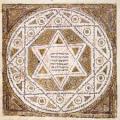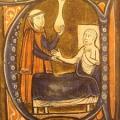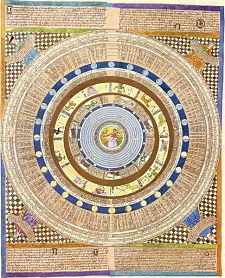125 - Reasoned Belief: Saadia Gaon
Posted on
Saadia Gaon draws on philosophy and Islamic theology to provide a rational account of Jewish belief.
Themes:
Further Reading
• Saadia Gaon, The Book of Beliefs and Opinions, trans. S. Rosenblatt (New Haven: 1948).
• Saadya Gaon, The Book of Doctrines and Beliefs [abridged], trans. A. Altmann (Indianapolis: 2002).
• R. Brody, The Geonim of Babylonia and the Shaping of Medieval Jewish Culture (New Haven: 1998).
• H.A. Davidson, “John Philoponus as a source of medieval Islamic and Jewish proofs of creation,” Journal of the American Oriental Society 89 (1969), 357-91.
• I. Efros, Studies in Medieval Jewish Philosophy (New York: Columbia University Press, 1974).
• H. Malter, Life and Works of Saadia Gaon (Philadelphia: 1921).
Stanford Encyclopedia: Saadya Gaon







Comments
Date error
Please note there was a typo in the script for this one - he died in 942, not 842! (Which stands to reason given that I said earlier in the episode that he was born in 882.)
In reply to Date error by Peter Adamson
I think there is a typo in
I think there is a typo in this comment as well :)
In reply to I think there is a typo in by Imran Ahmed
Meta-typos
Drat! Thanks, I fixed it.
In reply to Date error by Peter Adamson
I had spotted the discrepancy
I had spotted the discrepancy, because you had just said that he was an early ninth century figure, but I thought it was deliberate, because the date was followed by "take my word for it", and then you moved on to skepticism about taqlid. Maybe your initial intention *was* to provide a date that contradicted earlier information so as to illustrate the unreliability of testimony. I'd rather believe that than renounce my faith that your podcast is inerrant, as I've been told.
In reply to I had spotted the discrepancy by Jean-François Virey
Testimony
Yes, good! Let's go with that interpretation.
Al-Ghazali's successors, Ottoman era, Safavid era
Dear Professor Adamson,
Firstly I congratulate you for initiating the whole concept of "History of Philosophy". You have ended the formative period of Islamic Philosophy with Imam al-Ghazali. However, I can assert to a high extent that figures such as Imam Fakhr al-Din al-Razi, some Ottoman era theological philosophers, and some Safavid era Shiite philosophers such as Mir Damad and Mulla Sadra have been influential in the subsistence of philosophy in the Islamic relam.
Looking forward to your reply.
Kindest regards
Dhimmitude
The author obviously downplays the real nature of dhimmitude which not only involved pay a kind of mafia-style protection money to be allowed to live, but also to "feel oneself humiliated", not build or repair churches and synagogues. It's in the Quran, and the fact that some rulers might not have rigorously enforced it doesn't mean that it was not demeaning and that Jews and Christians.
In reply to Dhimmitude by Thomas Hennigan
Dhimmis
Yes, one shouldn't underestimate the "second class citizens" angle here, I agree with that. I am not an expert on this question but my impression is that actually non-Muslims were treated very differently in different places and times - so as we see in the Andalusia series, the situation there fluctuated from very favorable for Jews to absolutely terrible for Jews, within even just a generation or two. I hope that the series as a whole gets across this more nuanced picture. Anyway the main point I was making in this episode was that it was absolutely possible for Jews (and Christians) to be a major part of intellectual culture in the classical period of Islam, and that at least seems to be the norm and not the exception, even if they and Christians were also sneered at (even in intellectual settings, by the way, e.g. Sirafi mocking Abu Bishr for believing in the Trinity, as I mention in episode 128 I think).
A correction
You said: "Some Jews also accepted the possibly of abrogation (158), but Saadia firmly denies it" (minute 19 of recording, corresponding to p. 46 in the book). The referenced source (p. 158 in Rosenblatt's English translation [which corresponds to p. 132 in R. Yosef Kafih's Hebrew translation]) actually regards Jews Saadia's seen argue "to refute the theory of the abrogation of the Law," not to uphold it. Obviously those referred to as having accepted the possibly of abrogation are the Christians (plus Muslims?).
I appreciate all the research you've clearly put into this, thank you!
A gap
These podcasts are wonderful! In your discussions of Saadia's thoughts on free will, I do want to mention Pirkei Avot 3:15, where free will is discussed in Mishnaic literature (though as a statement, not with philosophical proofs) -- it seems to me that Saadia is not merely copying Mu'tazilite or Augustinian ideas here, and that there's a source other than Greco-Roman philosophy.
Add new comment